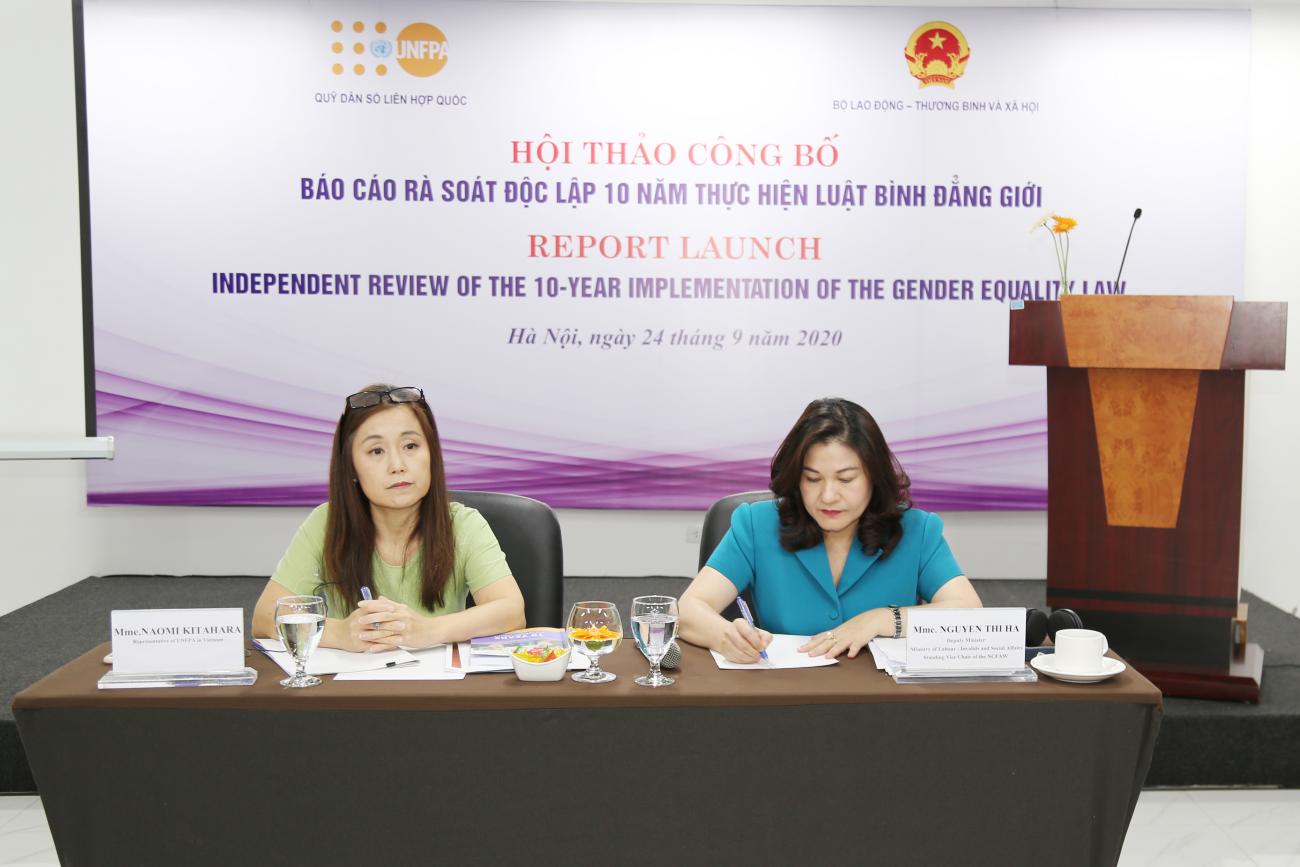Launch of the Review Report on the ten year implementation of the Gender Equality Law in Viet Nam

Review on the ten year implementation of the Gender Equality Law in Viet Nam
HA NOI, 24 September 2020 – The review report on the ten year implementation of the Gender Equality Law in Viet Nam was disseminated today by the Ministry of Labour, Invalids and Social Affairs (MOLISA), in collaboration with the United Nations Population Fund (UNFPA) in Viet Nam.
Viet Nam is a signatory to numerous international instruments addressing gender equality, women’s rights and women’s empowerment. In 2006, the country promulgated the Law on Gender Equality, which mandates Government bodies to fulfill their responsibilities on gender equality and to address violations.
After ten years of implementing the Gender Equality Law, the MOLISA was assigned by the Government of Viet Nam to review its implementation. Together with the internal review conducted by the Government led by MOLISA, UNFPA has financially and technically supported MOLISA to conduct the independent review since early 2018 to June 2019. It focused on the assessment of the Law’s consistency in relation to international human rights standards and other Vietnamese laws, and the effectiveness of the implementation of the Law by duty bearers for the period 2007 to 2019. It also focused on identifying the key achievements and gaps to inform the revision of the Law and ensure better implementation.
Gender equality is not only a fundamental human right, but a necessary foundation for a peaceful and prosperous society. Over the last decades, Viet Nam has become one of the countries in the Asia and Pacific region, which has made significant progress on gender equality in many socio-economic fields.
Addressing the event, Ms. Nguyen Thi Ha, Vice Minister, MOLISA/ Standing Vice Chairman of the National Committee for the Advancement of Women in Viet Nam said: “Viet Nam’s Gender equality work has created a positive change in awareness and behavior of the Government Leaders and officials, and community people, contributing to enhancing the role and status of Vietnamese women in the family as well as in society. A number of improved development indicators have put Viet Nam to a higher ranking in gender equality, which is highly regarded by the international community.”
“However, the implementation of gender equality in Vietnam is facing many difficulties and challenges. In fact, both men and women suffer the effects of gender inequality, but women and girls are more vulnerable,” added Ms. Nguyen Thi Ha.
The Vice Minister Nguyen Thi Ha also emphasized that: “The 10-year review of the implementation of the Law on Gender Equality has been completed with valuable inputs and comments in the context that the Law on Gender Equality should be reviewed and revised in the coming time.”
Viet Nam faces new challenges for gender equality due to the impact of the global economy, the strong development of the 4.0 technology revolution, natural disasters and climate change, and the demographic changes. These challenges require the country to develop specific policies and actions to maintain achievements and simultaneously address existing gender issues as well as emerging gender issues in the upcoming period. This effort continues to demonstrate Viet Nam’s strong commitment to achieving the Sustainable Development Goal 5 on gender equality and women empowerment.
“During 10 years of implementation of the Gender Equality Law, Viet Nam has become one of the countries in the Asia and the Pacific region, which has made a lot of progress on gender equality. We have seen remarkable achievements on women’s rights and leadership, notably in health and education and by strengthening the legal and institutional frameworks,” said Ms. Naomi Kitahara, UNFPA Representative in Viet Nam.
“As one of the 17 SDGs, gender equality and empowerment of women are indispensable for all aspects of people’s socio-economic lives. Gender equality is not only a basic human-right, but also a necessary foundation for a peaceful and prosperous Viet Nam. Without addressing the issue of gender equality, there is no way that Viet Nam can achieve SDGs by 2030,” Ms. Kitahara added.
At the launch event, leaders of MOLISA and UNFPA called for more joint efforts from the Government ministries and organizations, civil society, the private sector and the United Nations agencies in accelerating progress towards sustainable development by 2030, leaving no one behind.
Click the following links to read the review report:
MOLISA’s website: http://www.molisa.gov.vn and http://genic.molisa.gov.vn
UNFPA’s website: https://vietnam.unfpa.org/en/publications
For further information, please contact:
Ms Nguyen Viet Hai, Gender Equality Department, Ministry of Labour, Invalids and Social Affairs
Email: hainv@molisa.gov.vn - Tel: +84 (0)24 3826 9551
Ms Nguyen Thi Hong Thanh | UNFPA Communications
Email: tnguyen@unfpa.org | Tel: +84 (0) 913 093 363

